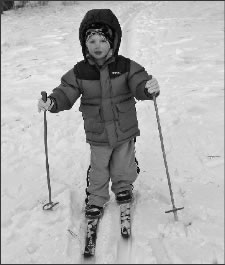by Hal Walter
It was just a few days before Christmas and my son Harrison and I went to the Westcliffe post office to mail out the holiday cards. The post office is a fairly harmless place to let Harrison run around while I take care of business. The only way out is the front door and there’s very little trouble he can get into.
I had most of the cards already stamped and just needed a few more stamps before dropping the cards into the slot. I figured I’d be in and out of the post office quickly as it was about to close.
That’s when the cashier noticed the square shape of the cards and informed me that they would all require additional postage. I bought the additional stamps and went out of the lobby to a counter where I could restamp all of the cards.

At first I managed to get Harrison engaged with putting the stamps on the cards. But he quickly grew bored with this, and then I employed him to run to the mail drop with cards as I stamped them. On the way back and forth he managed to help a few other postal customers — some of whom knew him — post their holiday mail.
Harrison is fascinated by doors big and small, so the mail drop held his interest. He also went with a few customers to collect their mail from post office boxes, and some allowed him to get their mail out and hand it to them, and to open and close the doors of their boxes. Most seemed cheery about having a happy 4-year-old boy help them with the Christmas mail.
I had just finished stamping the last envelopes when an older woman walked into the post office and Harrison followed her back to her postal box. I got the idea she was not as amused with this as the other customers. As I was headed back to fetch him, Harrison managed to push the lady’s mail all the way through her box and back out onto the floor behind the wall. The woman was not pleased and as I picked him up to carry him away he threw a bad tantrum, screaming, kicking and slapping me about the head.
The post office was now closed for business, but I managed to knock on the door and get the attention of one of the kind workers there to retrieve the lady’s mail.
But as I left, I’m certain I heard some unthoughtful and unsolicited commentary from the old woman. Another fairly smooth outing with Harrison had just turned into an embarrassing drama. It wasn’t the first and it surely would not be the last. What the old lady had no way of knowing is that Harrison isn’t a brat.
He has autism.
For about the past year I have been coming to terms with Harrison’s challenges. For several months I battled with the use of the label, but then a trip to Denver’s Children’s Hospital made it official. After a morning of tests the doctor, who I am sure had faced other skeptical fathers, looked right at me and told me: “It is autism.”
What I have come to learn over the year since this diagnosis is that the word means so many different things to so many different people, and the symptoms are so variable and come in so many different degrees — a true spectrum. I have spoken to very few friends and family members about this subject, and this is my first attempt to write about it. In fact, I would not even say the word “autism” for some time and have referred to it as “the A-word.”
I think there is some validity to my initial skepticism. Autism is a medical diagnosis but doctors don’t really know what it is or what causes it. A person can have autism to different degrees. And there is no concrete medical test such as a blood test or brain scan to determine if a person has it.
Instead, the diagnosis is made using subjective psychological tests. I say subjective because from what I saw and know about my son the results of Harrison’s testing could have been different given any number of variables, not excluding who was in the room during the testing, the mood of the child at the time of the tests, that the tests were given in unfamiliar surroundings, and that the tests were given in a room where there were many things that could be a distraction.
Still, we know that Harrison is different from other children his age, and these tests at least gave us something to pin it on. Beyond that, the label is really meaningless. I like to say he has learning differences rather than learning delays or disabilities. Harrison’s major challenge is speech and communication, and his biggest behavioral issue is screaming, usually out of frustration.
To our knowledge, Harrison is the only child in Custer County to be diagnosed with autism. The support of the community — especially the Custer County Preschool, Pam Urban’s Happy Hearts Preschool, Robin Gaide, who provides daycare and other parents — has been beyond belief, and I know that we would not have had such assistance and cooperation in a larger town or city. When I say support, I mean that everyone has done their best to include Harrison in all activities with the other kids, and to work with him on improving his communication skills. And because of this, his progress has been tremendous. In addition, proprietors and workers at local businesses are very patient and understanding when he causes disturbances in their stores, shops and offices.
There are some people — actual grownups — who say that children with autism are merely spoiled kids whose parents do not properly discipline them. These folks clearly have no clue what it’s like to live day in and day out with a child who has these challenges. If you would like a little taste of what it’s like, get on the Internet, go to www.youtube.com and watch a video called “Autism Every Day.” Oddly, there are no fathers featured in this short film.
Recently I watched the last half of another film about autism, “Rain Man.” Through the eyes of a older (I’ll be 49 this month) parent this movie is really an adventure, especially since the central character is a grown man with no living parents. There are the obvious stereotypical references to Raymond’s (Dustin Hoffman) autism: Watching clothes spin in a dryer; sensitivity to the bright and moving lights of Las Vegas and to loud noises; monotone emotionless speech; a lack of eye contact.
In fact, my son now rarely displays any of these behaviors though he has at some point in time exhibited many of them and it is not surprising to see him engage in one of them at any given time. As mentioned, he does have a fixation on doors and hinges. We are lucky that Harrison’s autism is considered to be “mild” and he has made tremendous progress in recent months. But this does not mean life is not challenging for all of us. A simple trip to the grocery or post office, for example, can either go just fine or turn into a nightmare.
The scene that made “Rain Man” real for me was near the end when Raymond was cooking some waffles in a toaster oven and they burned, setting off a smoke alarm and upsetting him terribly. It wasn’t Raymond’s reaction to the situation that made such an impression on me — it was Charlie’s (Tom Cruise) terror as he ran to the kitchen to see what was happening. The expression on Charlie’s face summed up what it’s like to be a parent or caregiver of someone with autism — you’re always on alert.
A full day later I laughed out loud when the actual meaning of the film’s title finally struck me.
One recent evening I taught Harrison to play catch. I did this by having him sit at the top of the stairs while I tossed a Nerf football up to him. The angle of the stairs allowed plenty of hang time for him to track the ball, put out his hands and make the catch. He snagged the sponge football several times and tossed it back down to me.
In the day-to-day dealings with autism, little victories like this can be huge, and can even help you forget a bad trip to the post office.
Hal Walter writes and edits from the Wet Mountains. You can keep up with him regularly at his blog: www.hardscrabbletimes.wordpress.com


